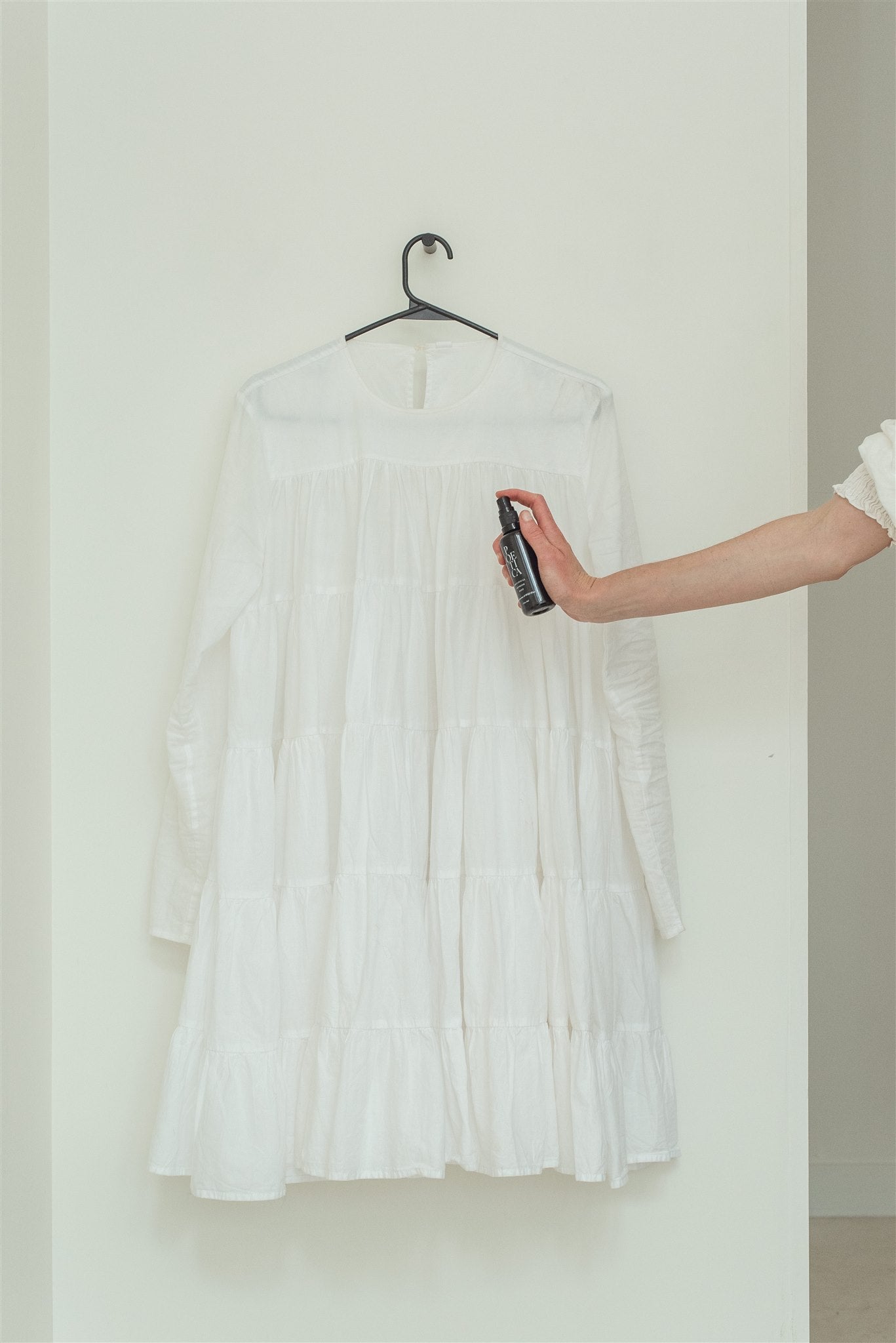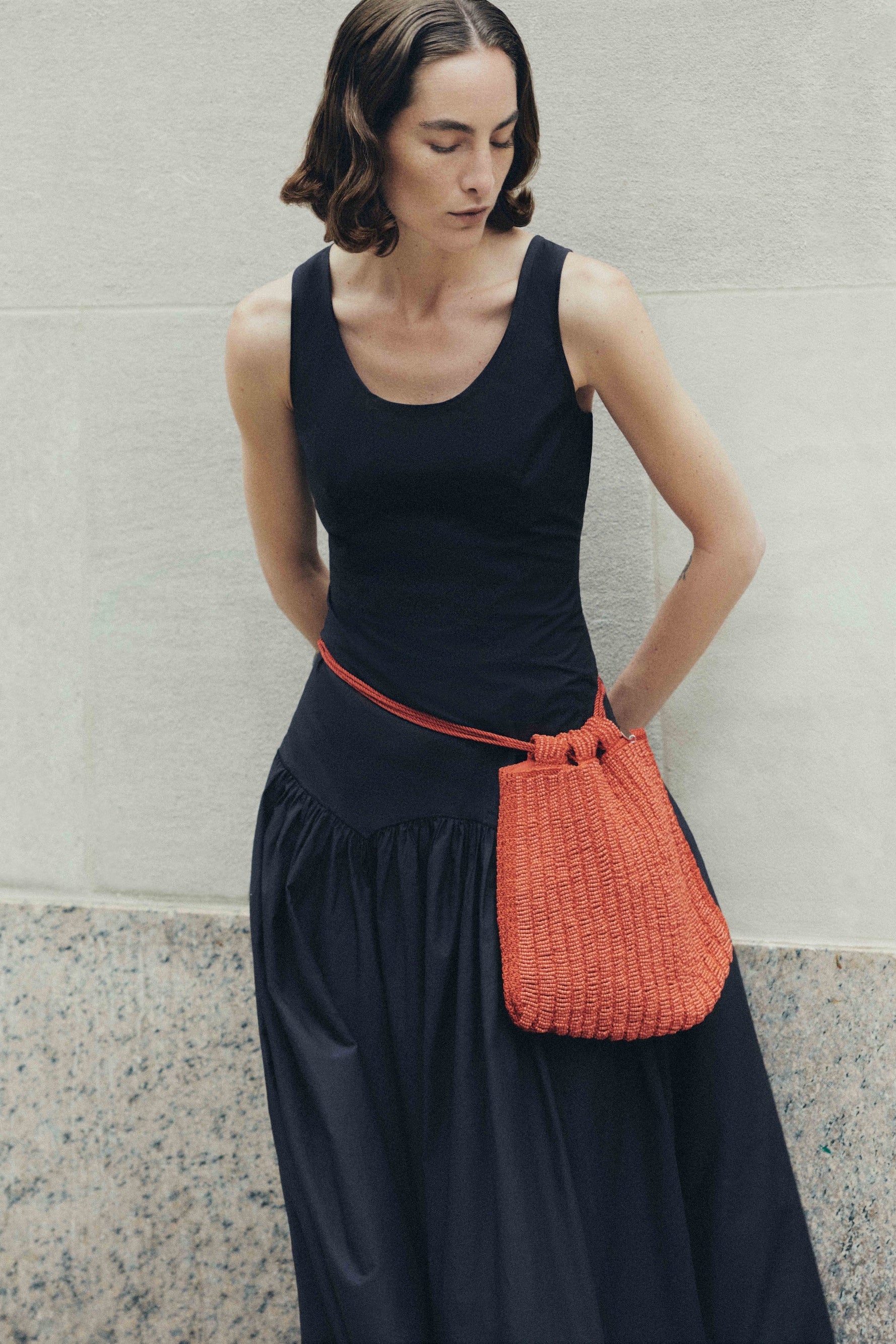HOW TO CARE FOR COTTON

Luxurious and lightweight, delicate yet durable, cotton is a fabric that stands the test of time—and it’s at the core of Merlette’s thoughtfully crafted garments. Proper care can greatly enhance and extend the life of a treasured piece, preserving it for years to come. To take a closer look at the best cotton care practices, we turned to Tess Albrecht-Schmitz, founder of Poetica and an expert in garment care.
Here, Tess shares her insights on how to maintain cotton’s integrity, ensuring pieces remain as beautiful as the day you first wore them. As an added bonus, she reveals the inspiration behind Poetica’s three sophisticated, elevated aromas—all crafted from natural essential oils. “With Poetica, I wanted to honor this more natural, botanical experience of scent and the connection we have to the land. It's the antithesis to that 'clean laundry' smell, which is anything but clean.”
Gentleness is Key
“When you can, gently hand wash your cotton pieces—or you can use the delicate cycle on your washer.”
Pre-Soak if Possible
“Ten minutes before you start a wash, pop the garment in a little cool water, add some delicate wash or even distilled white vinegar, and let it soak to dislodge any molecules that can cause yellowing over time.”
Cool Water, not Hot
“Always use cool water when you’re washing cotton. It's a myth that you need hot water to effectively clean a piece.”
Use a Delicate Wash
“More important than water temperature is the quality of your detergent. Invest in a high-quality delicate wash that's plant-based, pH-balanced and free from many of the enzymes and chemicals in traditional washes. Over time, they can really dull and degrade cotton.”
For Whites, Don’t Wait to Wash
“When it comes to whiter and brighter pieces in the wardrobe, be sure to wash regularly but gently—it can really help reduce build up that can cause yellowing over time.”
Skip the Fabric Softener
“Fabric softener may feel great to use at first, but it's actually just adding a lot of unnecessary chemicals to your garment. Those chemicals stay in the fabric, dull the garment, and weigh it down over time—which doesn't support its longevity.”
How We Choose our Scents
“Poetica turns everyday routines—washing your hands, bathing, and taking care of clothes—into sensory rituals. Our natural fragrances are inspired by the world's wild places, designed to reconnect us to nature in daily moments. Poetica's Lemon Myrtle & Cardamom fragrance offers a walk through Australia's native forests with its invigorating bush oils grounded in woods and spices; our hypnotic Jasmine Grandiflor scent evokes a midnight garden in bloom; and our Frankincense & Wild Mint scent imbues misty mountains with a fresh, cooling and restorative profile. We seek to honor the ecosystems our botanicals come from, so we work with 100% natural fragrances derived from organic, wild-harvested and regenerative origins, all methods of production that give back to the earth.”
Why Natural Fragrance Matters
“Synthetic fragrances are made of hundreds of petrochemicals, many of which are known allergens or carcinogens - so it's best to keep these out of your clothes and off your skin. As another historical inspiration, we're currently designing botanical garment bar soaps, a nod to the traditional European method of washing garments.”
Poetica Beyond the Laundry Room
“To elevate laundry—really one of the most intimate encounters one can have given our clothes are the closest layer between us and the world—we worked with perfumers to design truly transporting natural scents that easily parlay into broader lifestyle uses. Really, our scents are like fine perfume for your clothes, so you'll crave the scents anywhere and everywhere else!”
Why Essential Oils Matter
“Working with essential oils, we're benefiting from live materials with antimicrobial qualities alongside beautiful aromas, making our scents highly versatile. Our aromatic mists are a great example of this—they can be used to freshen clothes between washes, lightly scent linens and textiles around the home, and refresh your yoga mat and suitcase when traveling.”





